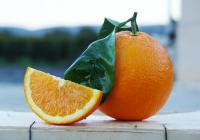
Owing to citrus greening, exports of organic orange juice from Cuba have fallen within a few years from around 1000 tonnes to approximately 25 tonnes today - a collapse of more than 95 per cent. When, in 2011, HLB was also sighted in Yucatan, in southern Mexico, the Coop supermarket chain sprang into action and set up a project with FiBL to pre-empt the disease. Firstly, growers were taught to remove host plants and to recognise the disease vector, the Asian citrus psyllid Diaphorina citri. They also learned which bioinsecticide would help and when, and so avoided having to spray with the chemical insecticides prescribed by the government.
Colourful flowers are a valuable ally
Field trials conducted at different sites over several years revealed something astonishing: on average, 570 specimens of the psyllid are present in each hectare of organic orange orchard every year, whereas 4230 were found in conventional orchards. This means that there are seven times fewer in organic systems. “This result shows clearly what can be achieved just by not using the herbicides that conventional growers use to suppress the vegetation beneath the trees,” says Salvador Garibay, the FiBL project leader and a Mexican by birth. “In organic farming, where herbicides are banned, flowers of all colours appear automatically and attract a more diverse and therefore better- balanced insect population. This brings ecological equilibrium to the agrarian system.” Conventional growers can benefit from these findings as well. In addition, plant tonics are being trialled to improve the trees’ natural resistance to insects and bacteria. Moreover, the team found among existing bioinsecticides a fungus that kills the psyllid. Tests are now being carried out to see if this fungus is harmless to beneficial insects. A wasp that parasitises the psyllid is also soon to be assessed for release. In short, the team is working flat out to save the citrus trees.
More information HERE
Source: FIBL



